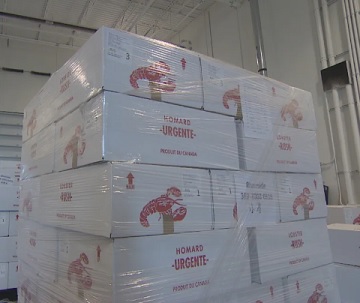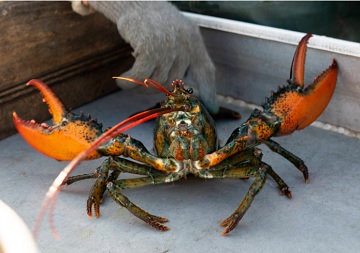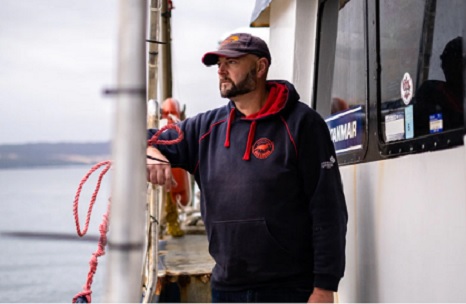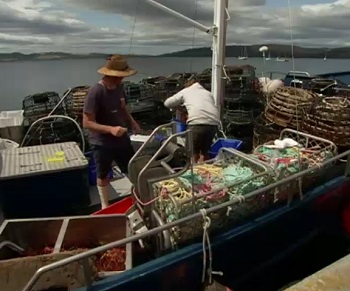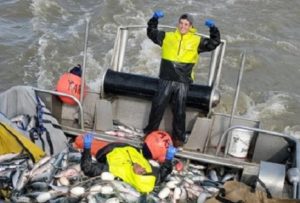Tag Archives: China

Cassidy Urges International Trade Commission to Keep Antidumping Orders on Shrimp from China, India, Thailand, Vietnam
U.S. Senator Bill Cassidy M.D. (R-LA) expressed his support for continuing antidumping orders on imports of frozen warmwater shrimp imported from China, India, Thailand, and Vietnam in a letter to U.S. International Trade Commission Chairman David Johanson. Cassidy highlighted the importance of these antidumping orders to ensure Louisiana’s shrimp industry can compete on a level playing field. “Dumped imports from China, India, Thailand, and Vietnam surged into the U.S. market, driving down prices, depressing earnings, and making it increasingly difficult to cover the costs of production. Faced with declining revenues and market share, many small fishermen, processors, and distributors were forced to close. The orders have imposed needed discipline on imports and allowed our vital Louisiana shrimp industry to survive,” wrote Dr. Cassidy. >click to read< 14:40
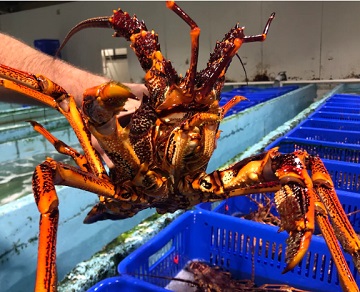
Signs China will discuss lifting trade ban, but Australian lobster fishers say diversification crucial
Trade Minister Don Farrell is yet to meet his Chinese counterpart but says ambassador Xiao Qian has indicated his government is “prepared to have these discussions”. “My job now is to convince China to change its view,” Mr Farrell said. Gordon Lewis owns two fishing boats in Port Macdonnell, South Australia, one of the country’s largest rock lobster fisheries. He said after fishing for the first few days of the season, he pulled his boats out for more than two weeks because volatile prices had made it unaffordable. “Everyone is struggling,” he said. With China no longer taking the majority of the catch, oversupply in the domestic market led to a price drop. >click to read< 09:47
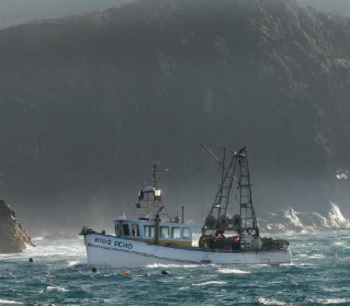
Rock lobster back on the menu
New Zealand’s rock lobster industry is catching up on a slow year thanks to the end of a Chinese lockdown and the conclusion of an unlucky spiritual festival. Shanghai is one of New Zealand’s biggest lobster importers, but the city was locked down from March to June. Fiordland Lobsters sales and marketing general manager Andrew Harvey said it had taken time for the industry to get back up to speed. That was combined with Ghost Month, a time dedicated to the spirits of the dead which spanned from late July to August. Australia banned exports of lobster to China in 2020, which had also increased the New Zealand share of the market and helped it through some of the slow patches. >click to read< 08:47
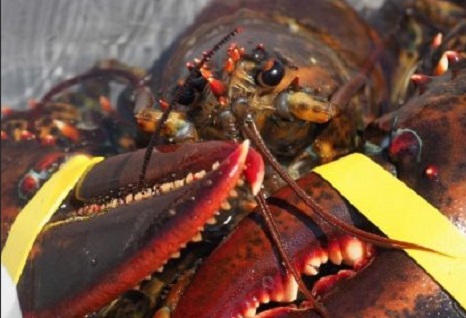
We’re eating less lobster, just as fall fishing season begins
After reaching record high prices in the spring, the shore price for a pound of Atlantic lobster has dropped dramatically, from around $18 to $5. Low demand, both domestically and internationally, and inflation are contributing to this drop, say industry professionals, who are concerned about the rising costs to fish and distribute the product as the fall lobster fishing season commences. Stewart Lamont, managing director of Tangier Lobster Company, a live lobster exporter in Nova Scotia, said consumer purchasing habits have changed since the beginning of the pandemic. >click to read< 07:47

Canadian Lobster industry sense more regulations coming for Chinese exports
In January, the Chinese Government introduced new import regulations known as Decrees 248 and 249, which require international distributors to register with the General Administration of Customs of China (GACC), and for products to include Chinese-language labeling. Since their implementation, there have been many issues, with lobster distributors claiming they have erroneously been told they aren’t registered with GACC, causing delays in shipping and in sometimes voiding the Chinese importer’s obligation to pay. Currently, the regulations only apply to frozen or cooked products. >click to read< Tracing measures issued in January required Chinese-language labelling on processed seafood >click to read<14:56

Despite war ban, Russian seafood could enter the US anyway
Fishing is big business in Russia, one closely linked to the Kremlin and President Vladimir Putin’s projection of power at sea. The country is one of the world’s top seafood producers and was the eighth-largest exporter to the United States last year, with more than $1.2bn worth of sales, the bulk of it king crab. But it is unknown exactly how much manages to land in the US by way of China, which sent another $1.7bn in fish to the US last year. Nor does the Biden administration’s ban require companies importing from China to find out. But the same species is also harvested in Russia in similar amounts, and once processed and imported from China, fills an important gap in the US market. In lieu of tracing the country of origin, US producers rely on the name recognition of Alaska pollock to signal where the fish was caught. >click to read< 17:31
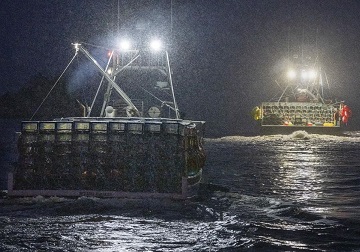
The value of Canadian lobster exports has skyrocketed driving the wharf price toward a record high
Two weeks ago, at wharfs in Nova Scotia, the price of lobster was the highest it has ever been. Stewart Lamont, managing director of Tangier Lobster Company, a live lobster exporter in Nova Scotia, said the shore price for lobster, the amount fishermen get from buyers, was $18 a pound. That’s more than double the regular pre-pandemic price. It has since gone down due to a drop in exports and higher supply. Lamont said this week lobster was around $12 to $12.50 a pound. While high prices mean more money for lobster exporters and fishermen, Lamont said he is scared that if lobster becomes too expensive, people and businesses will simply stop buying it. >click to read< 10:52
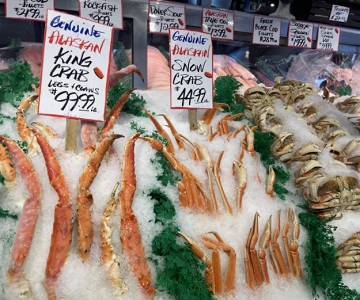
Trade war, Covid and now Ukraine invasion eat into Alaska seafood sales
First a trade war, then a battle against an infectious virus and now a real war are all affecting Alaska seafood exports. Shipments to China fell from as high as 30% of Alaska’s total seafood export value in the 2010s to 20% in 2020. “The U.S.-China trade war has displaced $500 million of Alaska seafood,” And though people bought more seafood to prepare at home during the COVID-19 pandemic, sales to restaurants and food services fell by 70%, Woodrow said. The food service market “still hasn’t fully recovered.” The Alaska product at risk in Russia’s invasion of Ukraine is pink salmon roe. Eastern Europe is a major buyer of the product, he said. “It’s a regional preference.” Alaska in 2021 shipped to Ukraine about $20 million of pink salmon roe,,, >click to read< 11:37

Canadian lobster exports have biggest year ever, topping $3.2B last year
The value of Canadian lobster exports topped $3.2 billion last year, the highest ever and more than $700 million higher than pre-pandemic levels, according to new trade data. Soaring sales of Canadian frozen and processed lobster in the United States during 2021 accounted for most of the increase. “We had a very strong bounce back from the pandemic as people ate premium protein that they bought in grocery stores. They wanted healthy food, they wanted safe food and they wanted a treat. So they buy lobster,” said Geoff Irvine, executive director of the Lobster Council of Canada, an industry trade group. >click to read< 07:57

U.S. lobster set to feed another Chinese New Year as demand booms
The week-long holiday, commonly known as the Spring Festival or the Lunar New Year, is typically one of the busiest times for the U.S. lobster business. Appetite for the crustaceans remains strong in China this year, despite pandemic-related challenges to transportation and logistics, according to U.S. lobster industry members. “I have orders every day. Whether I can get them all on the airplanes every day becomes a question,” Bill Bruns, operations manager at The Lobster Co. >click to read< 08:16

A Preposterous Claim: Chinese media says Maine lobster shipment was ‘Pandora’s box’ behind pandemic
A recent article in the Sina news portal, one of the most read on China’s state-controlled internet, reported that in mid-November 2019, a batch of seafood from Maine was shipped to the “Wuhan South China Seafood Market,” also known as the Huanan Seafood Market, where the virus was first reported in late 2019. According to the translated Sina article, within a few weeks, employees in the market began experiencing “symptoms of pneumonia of unknown origin one after another.” Sina named “the Seashell Company” in York County as the original source of the lobster. >click to read< There was talk about that in 2019 during the trade war,,, US-China Trade Deal: US lobster dealers anxious to resume business with China –Hugh Reynolds, a lobster dealer from Stonington, Maine, was excited to learn that the China-US phase-one economic and trade deal came into effect on Feb 14., >click to read< >Search results for China, Lobster< 13:41
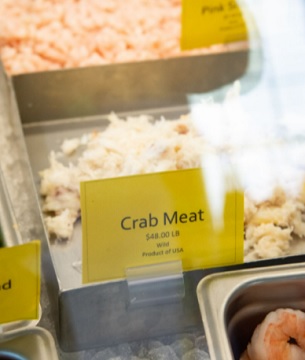
Pandemic, labor , product shortages, and supply chain issues disrupt Dungeness Crab market
Seafood distributors, sellers and processors point to a number of factors that converged to create a perfect storm: the coronavirus pandemic, labor shortages, product shortages, supply chain issues and market demands. All have contributed to drive prices up from the usual $25 or so per pound to as much as $52. This season was difficult for many in the industry. It opened late and yielded a mere 12 million pounds to date, compared to last year’s 20 million. On average, commercial crabbers land around 16 million pounds in Oregon, though the fishery can be cyclical, with boom and bust periods. >click to read< 19:13
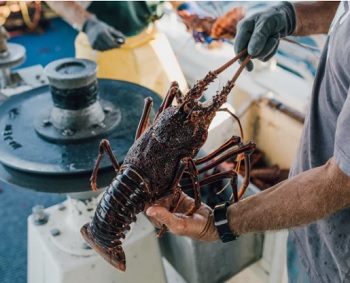
Banned Australian lobsters are sneaking into China via Hong Kong
Since direct shipments to China virtually ground to a halt last November, Hong Kong has become the world’s largest importer of Australian lobsters, with monthly trade growing more than 2000 per cent from October to April. While lower prices will have spurred some increased demand from Hong Kong consumers, experts say the dramatic spike is more likely due to a grey trade as the tasty crustaceans are sent across the border to the mainland. >click to read< 09:22
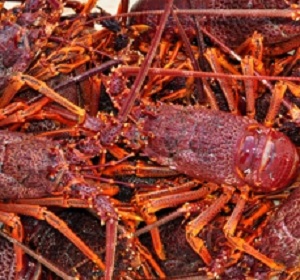
Australian lobsters back on the Chinese menu as ‘grey trade’ fires up again
Australian lobster fishermen shut out of mainland China appear to be selling millions of dollars’ worth of crayfish to the once-booming market via unofficial “grey channels”, trade experts say. Commercial fishers across the country were left reeling in November when China appeared to impose an unofficial ban on Australian lobster exports that had been worth hundreds of millions of dollars. The suspension effectively stopped the trade with China, which had been buying more than 90 per cent of lobsters exported from Australia. >click to read< 11:48

A “heavy mental impact” – Tasmania’s rock lobster industry suffers in trade war
Beijing cancelled the China Australia strategic economic dialogue this week, effectively ending trade relations between the two countries. For Tasmania’s rock lobster fishers this trade war is real and destroying their livelihoods and businesses in less than 12 months. Lobster fisher Kane Ebel said there was a “heavy mental impact” to the trade war. “When you get out of bed in the morning and you’ve got big debts on your boat and your house and effectively can’t go to work, it’s got to take a toll,” he told Sky News. >click to watch< 18:48
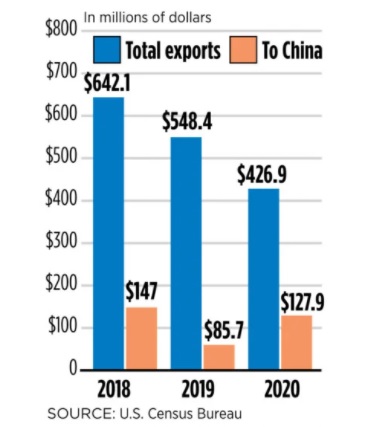
U.S. lobster exports to China rebounded in 2020
While the coronavirus pandemic tanked U.S. lobster exports overall in 2020, international trade data suggests the industry’s once-thriving U.S. to China trade pipeline may be making a comeback. International sales of U.S. lobster fell by 22 percent last year, from $548.4 million in 2019 to $426.9 million in 2020. The market saw declines in sales to each of the country’s top 10 international buyers, with the notable exception of China, which bought more than $127 million of U.S. lobster, or a roughly 49 percent increase over 2019, according to the U.S. Census Bureau. >click to read< 10:34
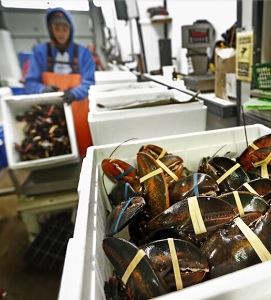
Coronavirus: Why the Lunar New Year matters for Maine lobster shippers
The Lunar New Year is typically one of the busiest parts of the calendar for America’s lobster shippers, who send millions of dollars worth of the crustaceans to China every year. This year the holiday is Friday, and industry members said the Year of the Ox won’t necessarily be the Year of the Lobster. That’s because shipping has been complicated this winter by the threat of the virus. Mike Marceau, vice president of The Lobster Company in Arundel, Maine, said he isn’t expecting much in the way of exports. >click to read< 08:44
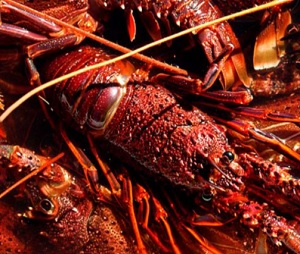
China’s lobster ban helped lift Australian Christmas seafood purchases by 30 per cent
It was a difficult 2020 for Australian fishermen with COVID-19 affecting both food service and export markets. “We needed a bumper Christmas period to help us claw our way back,” Veronica Papacosta, CEO of Seafood Industry Australia (SIA) said. It seems that SIA’s campaign calling on consumers to support the struggling sector, by switching one meal on the Christmas table to seafood, worked. “We’re hearing from retailers and producers right across the country that they’re up, on average, 30 per cent from last year’s December sales,” >click to read< 07:49
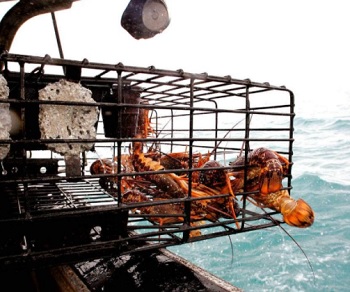
New Zealand crayfish in hot demand in China, selling for $100, as China-Australia relations sour
Though this time of year is usually quiet a shift in global politics has made for a busier November and December than expected. A diplomatic stoush saw China refuse various Australian exports, including live crayfish, also known as kōura or rock lobster. Suddenly Chinese buyers are paying a lot more to get hold of New Zealand crays. The extra cash has been a welcome boost, after the industry’s $38m loss during lockdown. >click to read< 16:43
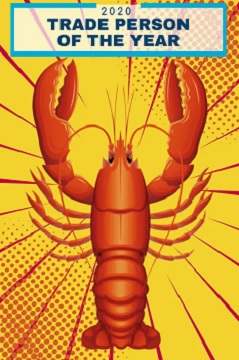
Lobsters Are A Prawn In The Trade Wars
American lobster and lobster fishers got caught in a trade war being fought on multiple fronts. The United States is battling China on one major front and the European Union (EU) on another, but as is typical in trade wars, it’s lobster production in another country that’s winning the war. In this case, Canada. If that weren’t enough, tariffs are the root cause of the trade war, but not in the way you might think. China’s tariffs on U.S. lobsters are in retaliation for President Trump’s China tariffs over intellectual property. The EU didn’t raise its tariffs on U.S. lobster, but rather lowered them on Canadian ones as part of their free trade agreement. In other words, U.S. lobsters were never meant to be the target of either Chinese or EU,,, How the lobster trade war started isn’t nearly as interesting as the efforts to stop it. >click to read< 10:28

Trade minister says she’ll keep eye on U.S. probe of Canadian lobster industry
The Canadian industry gained most of the Chinese market that the Americans lost after China slapped a 35 per cent tariff on U.S. lobster exports. Canada also saw its lobster exports grow in Europe after it signed the Comprehensive Economic and Trade Agreement, or CETA, with the European Union, giving it a tariff advantage over its U.S. competitors. The Trump administration, however, has recently signed an agreement with China that removes the 35 per cent tariff. And a separate deal with Europe also removed tariffs on American lobsters that had provided the Canadian industry an advantage. Executive Director Geoff Irvine (Lobster Council of Canada) said Monday the lobster industries of Canada and the United States are now back on an even playing field. >click to read< 07:17
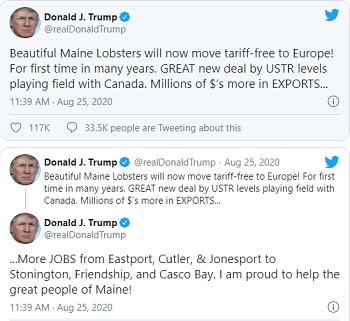
USDA trade aid for lobster industry using coronavirus coffers
The Trump administration is committed to starting an aid program to help the struggling lobster industry, Agriculture Secretary Sonny Perdue said Wednesday, but the funds to do so will come from the coronavirus stimulus package, not the aid used to bail out farmers after President Trump’s trade war with China. The lobster industry, like many others during the coronavirus outbreak, has seen losses as markets on cruise ships and restaurants evaporate.,, Trump has began paying considerable attention to Maine’s lobster industry starting this summer, traveling to Bangor in June to announce he would reverse protections for the Northeast Canyons and Seamounts Marine National Monument. >click to read< 18:07

‘Okay, so what do we do?’ – New Markets Reshape Crab Industry
“China shutting down was when we first started to feel the impact of the (coronavirus) pandemic, then the closures of restaurants and stores hit us full blast,” says Novotny. “All of a sudden nothing was going out.” “But necessity is the mother of invention. Everyone from the crabbers to the processors to the mom-and-pop places started saying, ‘Okay, so what do we do?’ and you started to see Pacific Seafood start shipping crab all over the country.” Until the pandemic, flash-freezing techniques, which freeze crabs in a briny block of ice to maintain flavor and texture, was a niche market, used primarily for small orders. >click to read< 10:37

New Beijing coronavirus outbreak deals blow to China consumer confidence with seafood sales dropping 70%
The new COVID-19 outbreak in Beijing has dealt a heavy blow to the nation‘s seafood sector, pushing sales down 60-70 percent compared with pre-pandemic levels, and analysts said it‘s the worst time for the industry in decades. Seafood orders are canceled and marketplaces are shut in Beijing, where about 25 percent of China‘s seafood consumption takes place. Consumers elsewhere in the country are cautious, too, and it‘s taking a heavy toll on the sector. >click to read< 12:50

N.S. Premier Stephen McNeil: China not ‘reasonable’ requiring lobster shippers to assume Coronavirus liability
“I don’t believe that the requirement to accept liability on live seafood going into that marketplace is a reasonable one,” McNeil told reporters in Halifax Thursday. China is the second largest market for Canadian lobster, with exports of live lobster alone in 2019 valued at $457 million, most of it supplied by inshore fishermen from Nova Scotia. That demand has upended traditional economics in the fishery. Even as landings soared in recent years, the increased demand from China helped keep prices up. Earlier this year, it came crashing down when China shut down because of the Coronavirus pandemic. >click to read< 09:50






